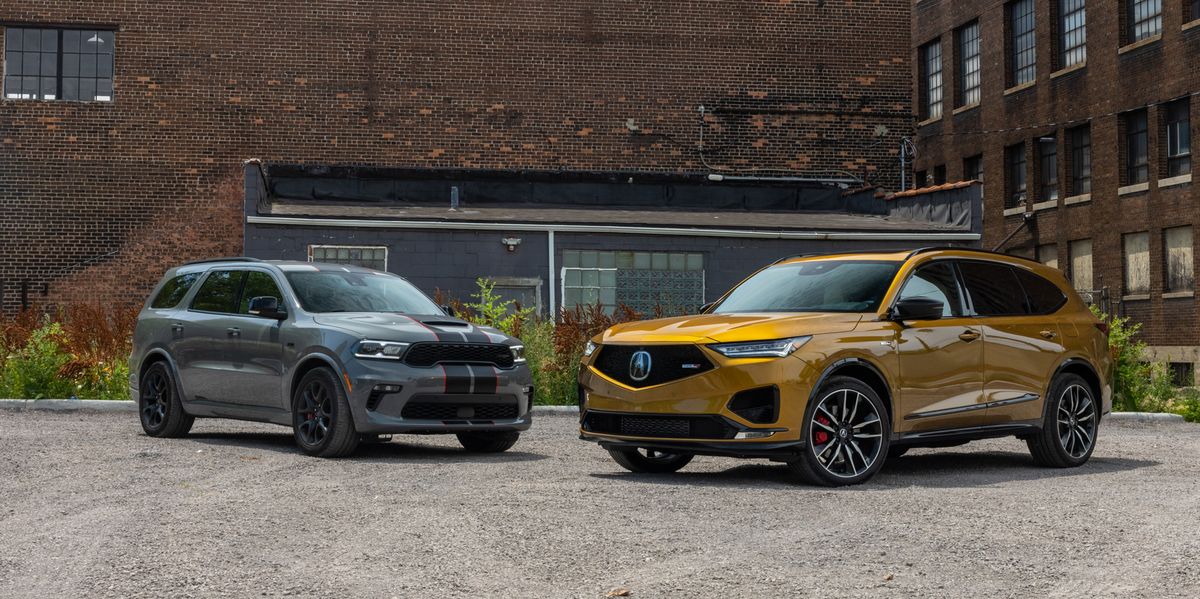Tested: 2022 Acura MDX Type S vs. 2022 Dodge Durango SRT 392

From the September 2022 issue of Car and Driver.
The Acura MDX Type S and the Dodge Durango SRT 392 are proof that there’s more than one way to skin a three-row performance SUV. That’s clear the moment you hit their respective start buttons. The Durango’s 475-hp 6.4-liter V-8 snarls to life like a lion, whereas the MDX’s 355-hp turbocharged 3.0-liter V-6 awakens with a demure purr.
What they do have in common is that they start around $70,000, and their standard three-row seating is a prerequisite for larger families. The Durango SRT 392 and MDX Type S are unusual in this space in that each is a dedicated performance model, which set up our head-to-head battle. It’s a specific niche, but we wanted to see which better fulfills the promise of its performance badge.
Andi HedrickCar and Driver
Since the early 2000s, Dodge’s SRT division has created numerous high-performance machines. The Durango SRT 392 debuted in 2018 with the pushrod Hemi V-8 and a specially tuned chassis. Despite old bones, its Mercedes DNA and independent rear suspension elevate its ride-and-handling traits over those of previous Durangos. Dodge also recently redesigned its interior, adding a user-friendly 10.1-inch touchscreen and richer materials. Still, various hard plastics and outdated bits remain. While the 2022 Durango SRT 392 starts at $70,555, options ballooned ours to $85,930. Only the $1295 Brembo brake upgrade and $595 Pirelli P Zero Run Flat summer tires improve performance, however.
Andi HedrickCar and Driver
2nd Place:
Acura MDX Type S
Highs: Feels light and athletic, ride is smooth and quiet, seats are adjustable and comfortable.
Lows: Incognito exhaust note, unreliable brake-pedal feel, odd performance compromises.
1st Place:
Dodge Durango SRT
Highs: Shockingly swift for its size, superb automatic transmission, visceral V-8 soundtrack.
Lows: Awful fuel economy, some unluxurious interior bits, poor second-row-seat flexibility.
Andi HedrickCar and Driver
Acura made several Type S models from 2001 to 2008, then abandoned the designation. Now the beloved moniker returns, bringing the first-ever MDX Type S. It features a Type S–exclusive turbocharged V-6, adaptive dampers, air springs, and Brembo brakes. All of that is baked into its $67,895 base price. The $5350 Advance package (bangin’ ELS stereo, head-up display, massaging front seats) and $500 gold-colored paint pushed that to $73,745.
Compared with the higher-dollar Durango, the MDX is more luxurious and modern inside, and its highly adjustable driver’s seat provides a better seating position. Still, we’d rather interact with Dodge’s infotainment system than Acura’s unintuitive touchpad. Their shared mission is family transportation, and we prefer Acura’s kid-friendly, quick-folding second-row seats to Dodge’s cumbersome captain’s chairs that lack fore-and-aft adjustability. The Durango’s third row is more inviting, however, and it also holds more behind its third row in our box test.
Andi HedrickCar and Driver
Andi HedrickCar and Driver
The Dodge’s 6.4-liter V-8 is a liability at the gas pump, earning 17 mpg on our 75-mph highway test—embarrassing next to the Acura’s 23 mpg. The Durango’s brawny 8700-pound towing capacity, though, is almost twice that of the MDX.
At the track, the SRT-tuned Durango unleashes its inner dragster. Its launch-control system helps shoot it to 60 in just 4.3 seconds; the quarter-mile takes 13.0 ticks. The less powerful Type S is a second or more behind. Plus, its top speed is inexplicably limited to 111 mph (the SRT has a claimed 160-mph limit). The lack of a summer-tire option also compromises Acura’s performance commitment; even though the Type S has a virtually identical skidpad figure (0.87 g versus 0.88 for the Dodge), it took longer to stop from 70 (184 feet versus 174).
Andi HedrickCar and Driver
On the street, the MDX Type S is better isolated and smoother riding than the Durango. It’s also nimbler and more eager to rotate, aided by its torque-vectoring all-wheel-drive system. Sadly, its all-season tires squeal under less duress, and brake-pedal responses are inconsistent the harder it’s worked. Acura’s turbo six also sounds too subdued, and its 10-speed automatic too eagerly upshifts unless in Sport+ mode. All this makes us think “Type s” instead of “Type S.”
The SRT provides a more immersive experience. Its V-8 soundtrack is intoxicating, and its eight-speed automatic delivers delightfully quick sledgehammer shifts in Track mode. The Durango sits higher and is 703 pounds heavier than the MDX, but its predictable grip and reassuring body control encouraged us to drive it harder. It’s that confidence at speed that separates these performance-branded SUVs, more so than what’s under their hoods. It also proves the Durango better lives up to its badge.
A car-lover’s community for ultimate access & unrivaled experiences. JOIN NOW




